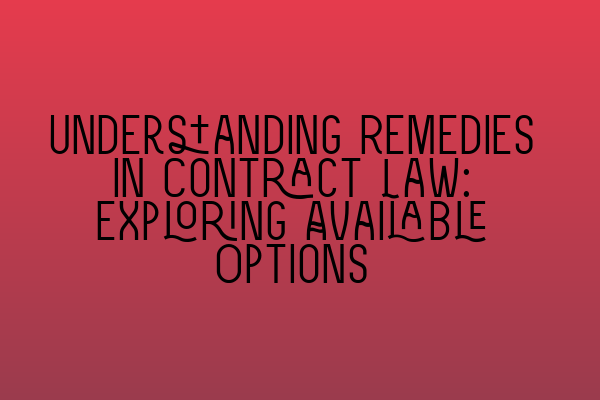Understanding Remedies in Contract Law: Exploring Available Options
In the world of contract law, disputes are bound to arise from time to time. When a party fails to fulfill their obligations under a contract, the non-breaching party often seeks a remedy to compensate for any losses suffered. This is where the concept of remedies in contract law comes into play.
Remedies are the legal means by which a party can seek to enforce their rights or seek compensation for any harm or losses suffered as a result of a breach of contract. It is essential for individuals in the legal profession, such as solicitors and lawyers, to have a comprehensive understanding of the various available remedies to effectively represent their clients’ interests.
1. Types of Remedies in Contract Law
There are generally two types of remedies available in contract law: legal remedies and equitable remedies. Let’s dive deeper into each of these categories and explore the available options.
1.1 Legal Remedies
Legal remedies are sought through court action and are typically aimed at compensating the non-breaching party for any financial losses incurred as a result of the breach. The most common legal remedies include:
a) Damages: Damages are the most common legal remedy sought in contract disputes. They are monetary compensation awarded to the injured party to put them in the same position they would have been if the breach had not occurred. Damages can be categorized into various types, such as compensatory damages, consequential damages, and nominal damages.
b) Liquidated Damages: In certain contracts, the parties may agree in advance on the amount of damages to be paid in the event of a breach. These predetermined amounts are known as liquidated damages and are enforceable as long as they are a genuine pre-estimate of the potential harm caused by the breach.
c) Specific Performance: In some cases, the monetary damages awarded may not be enough to fully compensate the injured party. In such situations, the court may order specific performance, which requires the breaching party to fulfill their contractual obligations as originally promised. This remedy is commonly sought when the subject matter of the contract is unique or when monetary compensation would be inadequate.
1.2 Equitable Remedies
Equitable remedies, on the other hand, are sought when legal remedies may not adequately resolve the dispute or when the non-breaching party is looking for remedies beyond mere compensation. The most common equitable remedies include:
a) Injunction: An injunction is a court order that prohibits a party from taking certain actions or requires them to perform certain acts. In contract law, injunctive relief can be either prohibitory or mandatory. Prohibitory injunctions prevent a party from doing something, while mandatory injunctions compel a party to take specific action.
b) Rescission: Rescission involves the cancellation of the contract and aims to restore the parties to their pre-contractual positions. It is typically sought when there has been a fundamental breach of contract or where one party has been induced to enter into the contract through fraud, misrepresentation, or undue influence.
c) Specific Performance: While specific performance is primarily considered a legal remedy, it can also be categorized as an equitable remedy. As mentioned earlier, specific performance compels the breaching party to fulfill their contractual obligations. It is particularly sought in cases involving the sale of land, unique goods, or contracts for personal services.
2. Factors Affecting the Choice of Remedies
The choice of remedy depends on various factors, including the nature of the breach, the type of contract, the interests of the parties involved, and the availability of specific remedies in the jurisdiction. Additionally, the court’s discretion and the concept of fairness also play a significant role in determining the appropriate remedy.
3. Conclusion
Understanding the available remedies in contract law is crucial for solicitors, lawyers, and anyone involved in contract disputes. By having a comprehensive understanding of legal and equitable remedies, legal professionals can effectively represent their clients’ interests and pursue the most appropriate course of action.
Whether it’s seeking damages, specific performance, injunctions, or rescission, the choice of remedy depends on the specific circumstances of each case. By understanding the intricacies of these remedies, legal professionals can navigate the complexities of contract law and work towards a favorable outcome for their clients.
Related Articles:
– If you’d like to test your knowledge on contract law, take a look at our SQE 1 Practice Exam Questions article.
– For additional practice, consider our SQE 1 Practice Mocks FLK1 FLK2 to further enhance your understanding of contract law.
– Need to brush up on your contract law knowledge before taking the SQE exams? Check out our SQE 1 Preparation Courses.
– Looking for comprehensive preparation for the SQE 2 exams? Explore our SQE 2 Preparation Courses.
– Stay updated with the latest SRA SQE Exam Dates to plan your study schedule effectively.
Remember, having a thorough understanding of remedies in contract law is essential for success in the legal field. So equip yourself with knowledge, stay prepared, and be ready to represent your clients diligently.
